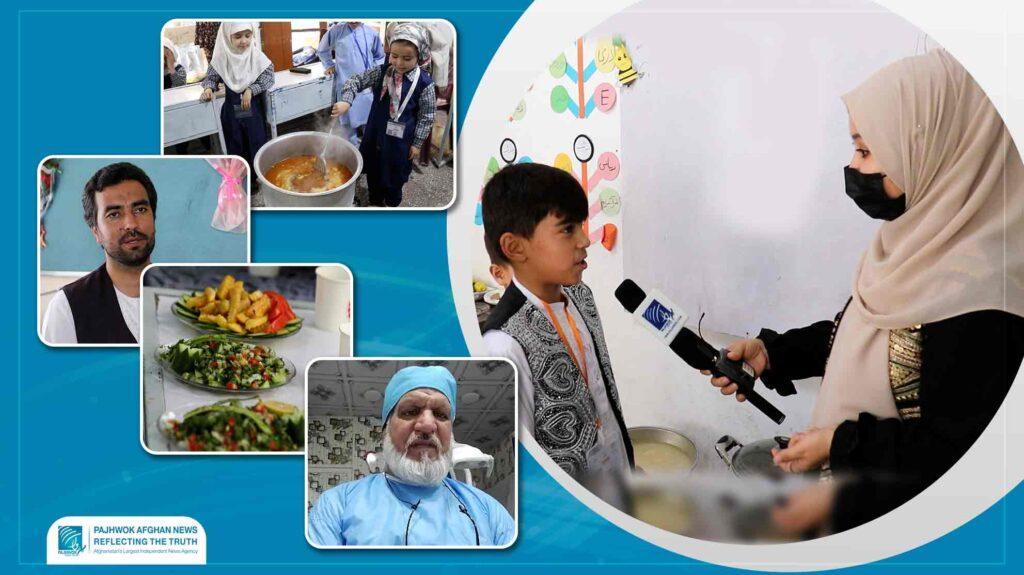
Kabul School Promotes Healthy Diet Over Snacks In Fresh Initiative
KABUL (Pajhwok): At a private school in Kabul, students prepare homemade healthy meals every Wednesday instead of harmful snacks sold in the market-a program that has not only changed their unhealthy eating habits but also encouraged families to prepare nutritious foods.
The private school Shahr-i-Buland in Kabul has launched a program called“Healthy Wednesday” to promote healthy eating and raise students' awareness about nutritious foods.
In this program, all students gather in the schoolyard to prepare homemade healthy meals and enjoy them with their friends.
Abdullah Alizada, the school's principal, told Pajhwok Afghan News that the aim of the program is to promote healthy nutrition and increase students' knowledge of beneficial foods.
Students from grades one to twelve take part, and each class prepares a healthy meal of their choice.
Pointing to unhealthy snacks and drinks available in the markets that threaten children's health, he said:“School is a place of learning. We decided to dedicate one day a week as 'Healthy Wednesday,' and on this day, students themselves come and prepare healthy foods... and eat them. Ultimately, they share the message that to have a healthy body, we must eat healthy foods.”
He explained that the program is held during break:“This program brings energy, excitement, and joy. We see that although the school canteen offers healthy food, no one goes there anymore. Instead, they spend the money they bring from home on these healthy meals.”
He added about the program's effectiveness:“Today we have a second-grade student who can prepare a healthy meal for an entire family! They can cook, and they know exactly where to begin and how to finish.”
According to him, some families initially opposed the program, but over time, the importance of“Healthy Wednesday” became clear. Now not only is there no opposition, but families themselves suggest healthy meal ideas for the day.
He also underlined the students' enthusiasm:“This program is so attractive for the students that two days before Wednesday, they come and ask us what they should prepare that week.”
Meanwhile, Mursal Raihani, head of the school's cultural department, said that on designated days, students from each class prepare a variety of foods and natural juices according to their interests, so they can enjoy healthy meals and drinks instead of unhealthy market snacks and chips.
She added that during meal preparation, teachers work with the students to teach them how to cook and prepare the food.
According to her, families also try on other days to send healthy homemade food with their children and the program has been so effective that now most parents prepare daily homemade snacks for their children to prevent them from consuming market foods.
In every corner of the schoolyard, students of each class, together with their supervising teacher, gather to prepare their favorite dish. The students all looked cheerful and happy.
Abulfazl, one of the students, prepared Qabili with his friends this week.
He said he really enjoys Healthy Wednesdays and has even learned how to cook Qabili.
He added that he no longer likes to eat market snacks, and his mother now sends him homemade food every day.
Sama Majid, a sixth-grade student who, along with her classmates, was cooking Ashak, said:“On Wednesdays we prepare healthy meals together, and today we brought leeks and dough to make Ashak.”
She praised the program and said that besides being fun, students also learn cooking skills and the importance of healthy foods.
According to Sama, before each Wednesday, she and her classmates research which foods are healthier to prepare.
On the other hand, Shahwali Ibrahimi, a medical expert and lecturer at a private higher education institute in Kabul, advised children to avoid consuming market snacks.
He said:“Snacks that children buy from the market or the street-like roasted chickpeas, chips, or bolani-are really harmful for their health. Many of these snacks are contaminated with parasites, fungi, and microbes. Eating them can cause sore throat, diarrhea, vomiting, fever, and chills, and they are not beneficial for brain or body growth.”
Ibrahimi recommended that families prepare and send homemade healthy foods for their children instead of letting them eat store-bought snacks.
sa/ma

Legal Disclaimer:
MENAFN provides the
information “as is” without warranty of any kind. We do not accept
any responsibility or liability for the accuracy, content, images,
videos, licenses, completeness, legality, or reliability of the information
contained in this article. If you have any complaints or copyright
issues related to this article, kindly contact the provider above.
Most popular stories
Market Research
- Thinkmarkets Adds Synthetic Indices To Its Product Offering
- Ethereum Startup Agoralend Opens Fresh Fundraise After Oversubscribed $300,000 Round.
- KOR Closes Series B Funding To Accelerate Global Growth
- Wise Wolves Corporation Launches Unified Brand To Power The Next Era Of Cross-Border Finance
- Lombard And Story Partner To Revolutionize Creator Economy Via Bitcoin-Backed Infrastructure
- FBS AI Assistant Helps Traders Skip Market Noise And Focus On Strategy




















Comments
No comment